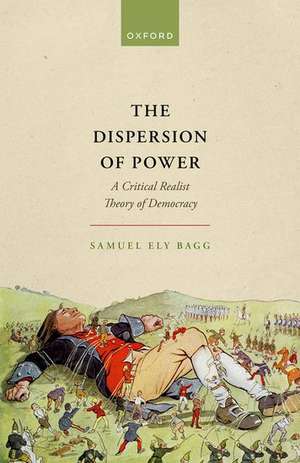The Dispersion of Power: A Critical Realist Theory of Democracy
Autor Samuel Ely Baggen Limba Engleză Hardback – 4 ian 2024
Preț: 634.89 lei
Preț vechi: 774.26 lei
-18% Nou
Puncte Express: 952
Preț estimativ în valută:
121.49€ • 125.53$ • 101.06£
121.49€ • 125.53$ • 101.06£
Carte disponibilă
Livrare economică 26 februarie-12 martie
Livrare express 11-15 februarie pentru 32.16 lei
Preluare comenzi: 021 569.72.76
Specificații
ISBN-13: 9780192848826
ISBN-10: 0192848828
Pagini: 304
Dimensiuni: 163 x 241 x 21 mm
Greutate: 0.57 kg
Editura: OUP OXFORD
Colecția OUP Oxford
Locul publicării:Oxford, United Kingdom
ISBN-10: 0192848828
Pagini: 304
Dimensiuni: 163 x 241 x 21 mm
Greutate: 0.57 kg
Editura: OUP OXFORD
Colecția OUP Oxford
Locul publicării:Oxford, United Kingdom
Recenzii
Democrats have failed to confront the realities of power, Samuel Bagg compellingly argues, frustrating their own hopes by thinking about democracy itself the wrong way. In doing so, they have helped reproduce hierarchy rather than prioritize mechanisms to counteract the risk of state capture. Few books are both important and original in their provocation, and even fewer explore an arresting insight with the generality and specifics to make it potent. The Dispersion of Power does all of this—and more.
In this impressive and compelling contribution to realist democratic theory, Samuel Bagg invites us to think about the ways that the concentration of power and money radically disrupts our ideals and practices of democracy. Bagg not only reviews the weaknesses of more conventional ideals of democracy but also outlines multiple practical strategies to fight the scourge of private wealth in politics. The Dispersion of Power is an urgent and important reminder that protecting the democratic state against oligarchic capture should take priority in our efforts to save democracy in this time of peril.
One of the most important developments in recent political theory is the growth of realist accounts and defenses of democratic politics. In that exciting wave of scholarship, Samuel Bagg has written the most intellectually ambitious book. He treats the central problem of politics as the management and checking of power, not the expression of collective will. From those chastened premises he seeks to build a grand reconciliation of democratic theory with liberal protections and with radical purposes. Realism is often accused of being minimalist, conservative, or sterile. This challenging and major work sets a new standard for what it is like to put realist thought to constructive and far-reaching work.
In recent years, there have been many abstract appeals for 'realism' in political theory. Samuel Bagg's excellent book demonstrates concretely how to be a realist, while holding on to democratic hopes. In an account both subtle and bracing, Bagg focuses on the dangers of concentrated power; and he shows a real path to organizing countervailing powers in order to resist capture of the state by private interests.
Though the book is thoroughly researched and scholarly, it is readable, with minimal jargon. Highly recommended.
In this impressive and compelling contribution to realist democratic theory, Samuel Bagg invites us to think about the ways that the concentration of power and money radically disrupts our ideals and practices of democracy. Bagg not only reviews the weaknesses of more conventional ideals of democracy but also outlines multiple practical strategies to fight the scourge of private wealth in politics. The Dispersion of Power is an urgent and important reminder that protecting the democratic state against oligarchic capture should take priority in our efforts to save democracy in this time of peril.
One of the most important developments in recent political theory is the growth of realist accounts and defenses of democratic politics. In that exciting wave of scholarship, Samuel Bagg has written the most intellectually ambitious book. He treats the central problem of politics as the management and checking of power, not the expression of collective will. From those chastened premises he seeks to build a grand reconciliation of democratic theory with liberal protections and with radical purposes. Realism is often accused of being minimalist, conservative, or sterile. This challenging and major work sets a new standard for what it is like to put realist thought to constructive and far-reaching work.
In recent years, there have been many abstract appeals for 'realism' in political theory. Samuel Bagg's excellent book demonstrates concretely how to be a realist, while holding on to democratic hopes. In an account both subtle and bracing, Bagg focuses on the dangers of concentrated power; and he shows a real path to organizing countervailing powers in order to resist capture of the state by private interests.
Though the book is thoroughly researched and scholarly, it is readable, with minimal jargon. Highly recommended.
Notă biografică
Samuel Ely Bagg is Assistant Professor in the Department of Political Science at the University of South Carolina, where he teaches political theory. He has also taught at the University of Oxford, McGill University, and Duke University, where he received his PhD in 2017. His research in democratic theory has appeared in the American Political Science Review; the American Journal of Political Science; the Journal of Politics; the Journal of Political Philosophy; and Dissent Magazine; among many other venues.
